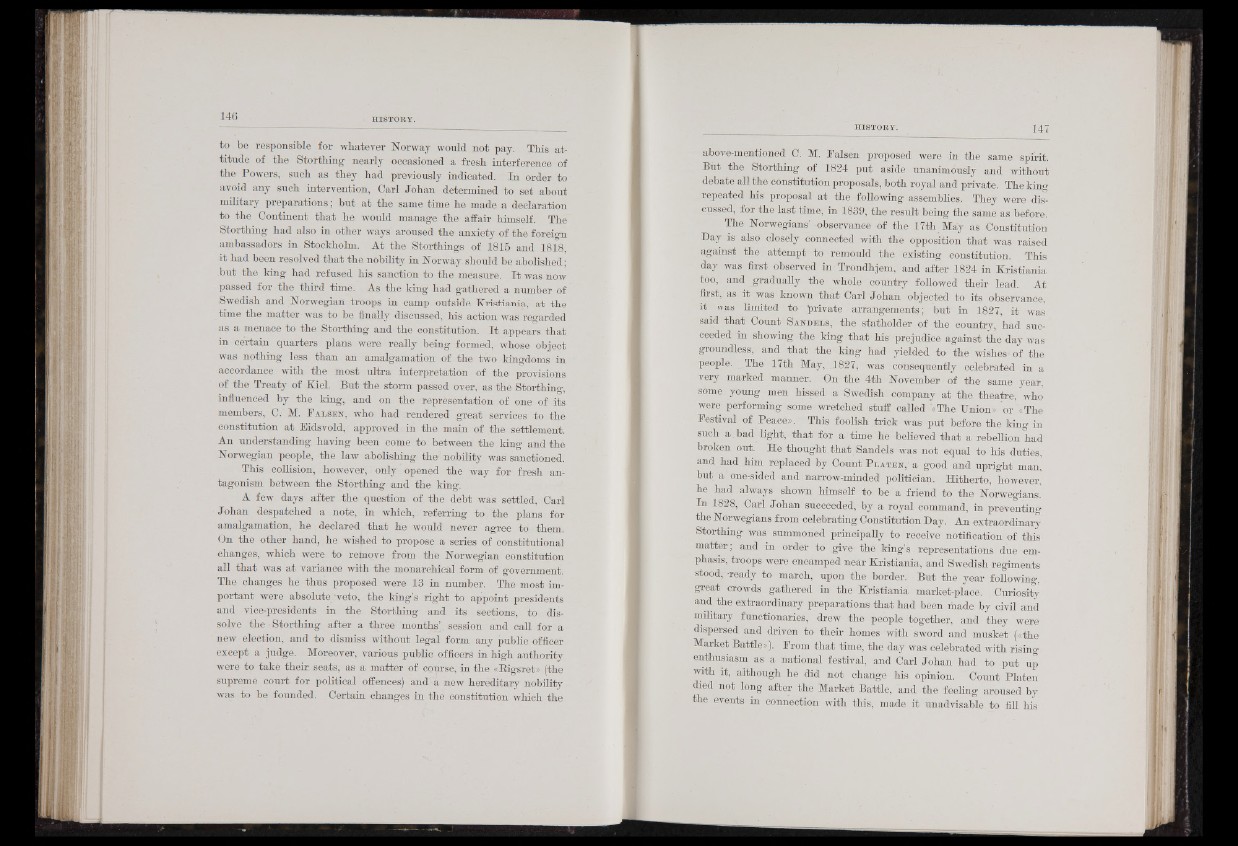
to be responsible for whatever Norway would not pay. This attitude
of the Storthing nearly occasioned a fresh interference of
the Powers, such as they had previously indicated. In order to
avoid any such intervention, Carl Johan determined to set about
military preparations. but at the same time he made a declaration
to the Continent that he would manage the affair himself. The
Storthing had also in other ways aroused the anxiety of the foreign
ambassadors in Stockholm. At the Storthings of 1815 and 1818,
it had been resolved that the nobility in Norway should be abolished ;
but the king had refused his sanction to the measure. I t was now
passed for the third time. As the king had gathered a number of
Swedish and Norwegian troops in camp outside Kristiania, at the
time the matter was to be finally discussed, his action was regarded
as a menace to the Storthing and the constitution. I t appears that
in certain quarters plans were really being formed, whose object
was nothing less than an amalgamation of the two kingdoms in
accordance with the most ultra interpretation of the provisions
of the Treaty of Kiel. But the storm passed over, as the Storthing,
influenced by the king, and on the representation of one of its
members, C. M. F a l s e r , who had rendered great services to the
constitution at Eidsvold, approved in the main of the settlement.
An understanding, having been come to between the king and the
Norwegian people, the law abolishing the nobility was sanctioned.
This collision, however, only opened the way for fresh antagonism
between the Storthing and the king.
A few days after the question of the debt was settled, Carl
Johan despatched a note, in which, referring to the plans for
amalgamation, he declared that he would never agree to them.
On the other hand, he wished to propose a series of constitutional
changes, which were to remove from the Norwegian constitution
all that was at variance with the monarchical form of government.
The changes he thus proposed were 13 in number. The most important
were absolute 'veto, the king’s right to appoint presidents
and vice-presidents in the Storthing and its sections, to dissolve
the • Storthing after a three months) session and call for a
new election, and to dismiss without legal form any public officer
except a judge. Moreover, various public officers in high authority
were to take their, seats, as a matter of course, in the «Bigsret» (the
supreme court for political offences) amUa new hereditary nobility
was to be founded. Certain changes in the constitution which the
above-mentioned C. M. Falsen proposed were in the same spirit.
But the Storthing of 1824 put aside unanimously and without
debate all the constitution proposals, both royal and private. The king
repeated his proposal at the following assemblies. They were discussed,
for the last time, in 1839, the result being the same as before
The Norwegians’ observance of the 17th May as Constitution
Day is also closely connected with the opposition that was raised
against the attempt to remould the existing constitution. This
day was first observed in Trondhjem, and after 1824 in Kristiania
too, and gradually the whole country followed their lead. At
first, as it was known that CarF Johan objected to its observance,
it was limited to private arrangements; but in 1827, it was
said that Count S a h d e l s , the statholder of the country, had succeeded
in showing the king that his prejudice against the day was
groundless, and that the king had yielded to the wishes* of the
people. The 17th May, 1827, was consequently celebrated in a
very marked manner. On the 4th November of the same year,
some young men hissed a Swedish, company at the theatre, who
were performing some wretched stuff called '«The Union» or’ «The
Festival of Peaoe». This foolish trick was put before the king in
such a,bad light, that for a time he believed that a rebellion had
broken out. He thought that Sandels was not equal to his duties,
and had him replaced by Count P l a t e r ,' a good and upright m a n ’
but a one-sided and narrow-minded politician. Hitherto, however,
he had always shown himself to be a friend to the Norwegians.
In 1828, Carl Johan succeeded, by a royal command, in preventing
the Norwegians from celebrating Constitution Day. An extraordinary
Storthing was summoned principally to receive notification of this
matter; and in order to give the king’s representations due emphasis,
troops were encamped near Kristiania, and Swedish regiments
stood,-ready to march, upon the border. But the year following,
great crowds gathered in the Kristiania market-place. Curiosity
and the extraordinary preparations that had been made by civil and
military functionaries, drew the people together, and they were
dispersed and driven to their homes with sword and musket* («the
Market Battle»). From that time, the day was celebrated with rising
enthusiasm as a national festival, and Carl Johan had to put up
with it, although he did not change his opinion. Count Platen
died not long after the Market Battle, and the feeling aroused by
the events in connection with this, made it unadvisable to fill his